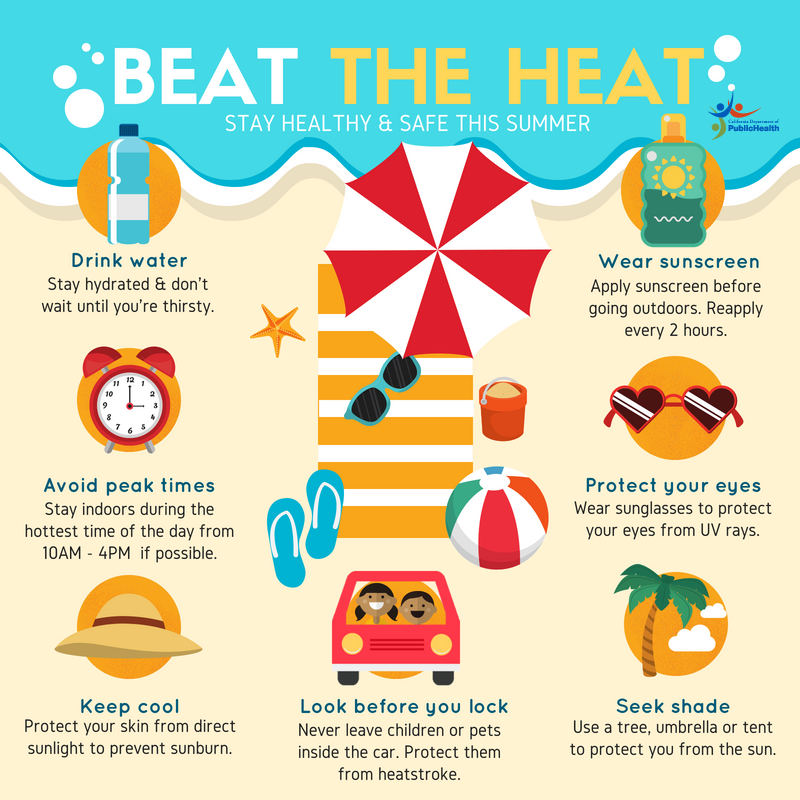Extreme Heat Resources for Newly Opened 2021
Yolo County officials urge all county residents to take measures to protect themselves accordingly during the summer heat. Vulnerable populations include individuals over 65 years of age, children under 4 years of age, those who work outdoors, people who are overweight and those who are ill or may be on certain medications that can affect their ability to handle fluids.
To prepare for extreme heat, you should:
- Build an emergency kit and make a family communications plan.
- Install window air conditioners snugly; insulate if necessary.
- Check air-conditioning ducts for proper insulation.
- Install temporary window reflectors (for use between windows and drapes), such as aluminum foil-covered cardboard, to reflect heat back outside.
- Weather-strip doors and sills to keep cool air in.
- Cover windows that receive morning or afternoon sun with drapes, shades, awnings, or louvers. (Outdoor awnings or louvers can reduce the heat that enters a home by up to 80 percent.)
- Keep storm windows up all year.
- Listen to local weather forecasts and stay aware of upcoming temperature changes.
- Know those in your neighborhood who are elderly, young, sick or overweight. They are more likely to become victims of excessive heat and may need help.
- Be aware that people living in urban areas may be at greater risk from the effects of a prolonged heat wave than are people living in rural areas.
- Get trained in first aid to learn how to treat heat-related emergencies.
For more information about extreme heat and other climate impacts, visit our Cool Davis Climate Impacts page.
Resources for elders, children, and more (Spanish and English)

According to the Governor’s Office of Emergency Services “each year approximately 20 people die from heat-related emergencies. In 2006 a severe heatwave resulted in 655 deaths and over 16,000 excess emergency room visits throughout the state.” Visit the CalOES Summer Heat Resources web page for ways to avoid heat-related emergencies.
Here are some tips on staying cool and safe during extreme heat:
- Be familiar with your local weather forecast by visiting www.weather.gov
- Eat well-balanced, light, and regular meals. Avoid using salt tablets unless directed to do so by a physician.
- Drink plenty of water and limit intake of alcoholic beverages. Persons who have epilepsy or heart, kidney, or liver disease; are on fluid-restricted diets; or have a problem with fluid retention should consult a doctor before increasing liquid intake.
- Check on family, friends, and neighbors who do not have air conditioning and who spend much of their time alone.
- Never leave children or pets alone in closed vehicles.
- Avoid strenuous work during the warmest part of the day. Use a buddy system when working in extreme heat, and take frequent breaks.
- And hotter weather also affects pets, so remember to give them plenty of water and keep them inside.
- Stay indoors as much as possible and limit exposure to the sun.
- Stay on the lowest floor out of the sunshine if air conditioning is not available.
- Postpone outdoor games and activities.
- Consider spending the warmest part of the day in public buildings such as libraries, schools, movie theaters, shopping malls, and other community facilities. Circulating air can cool the body by increasing the perspiration rate of evaporation.
- Limit intake of alcoholic beverages.
- Dress in loose-fitting, lightweight, and light-colored clothes that cover as much skin as possible.
- Avoid dark colors because they absorb the sun’s rays.
- Protect face and head by wearing a wide-brimmed hat.
- Avoid extreme temperature changes.
- Check on your animals frequently to ensure that they are not suffering from the heat.
- Go to a designated public shelter if your home loses power during periods of extreme heat.
Heat kills by pushing the human body beyond its limits. In extreme heat and high humidity, evaporation is slowed and the body must work extra hard to maintain a normal temperature. Most heat disorders occur because the victim has been overexposed to heat or has over-exercised for his or her age and physical condition. Older adults, young children and those who are sick or overweight are more likely to succumb to extreme heat.
During periods of high temperatures, those residing in homes without adequate air conditioning should find a friend or relative to stay with during the hottest parts of the day. Other locations in the community where air conditioning is available include a public building, shopping center, restaurant or movie theater.
The National Weather Service has tips and resources on heat safety. To view their resources simply go to: www.nws.noaa.gov/os/heat.
The California Office of Emergency Services has tips and resources on heat safety. To view their resources simply go to: http://www.caloes.ca.gov/ICESite/Pages/Summer-Heat-Resources.aspx.
The former content was excerpted from Yolo County Summer Weather Resources web page.
Federal Emergency Management Agency
NOAA Office of Climate, Water, and Weather Services
American Red Cross
National Integrated Drought Information System
Center For Disease Control and Prevention
Places to Cool Down at No Cost
Davis Senior Center
646 A Street, Davis
530-757-5696
seniorservices@cityofdavis.org
Hours: 9:00am-4:00pm
Davis Community Meals Shelter and Resource Center
1111 H St.
(530) 753-9204
Hours: 8:00am-12:00 pm, sometimes until 4:00 pm, call for more information.

Tags
FACEBOOK FEED
Happy Earth Day Yolo County! Please stand with Cool Davis and Give Big today. It's a beautiful day but the house is truly on fire. Your donation helps us keep afloat and douse the flames. #EarthDay2024 #bdog2024 Davis City City of Winters, CA City of West Sacramento, Government City of Woodland Yolo County Climate Action and Sustainability Valley Clean Energy UC Davis Sustainability
www.bigdayofgiving.org/cooldavis
... See MoreSee Less
Photos from Cool Davis's post ... See MoreSee Less






